
Management Board 2020/2022
Profª Janaina Coser
Dean of Graduate Studies, Research and Extension
Prof. José Ricardo Libardoni dos Santos
Dean of Administration
Center Deans
Jaciara Treter
Center for Human and Social Sciences
Leandro Kohl
Center for Health and Agrarian Sciences
Institutional
The University of Cruz Alta is an institution strongly rooted in its local and regional context, with a tradition of acting for more than 3 decades in higher education. It is a strong, consolidated, active, participatory institution, being a reference in the regional development of its region. It actively contributes to promoting effective transformations that raise the quality of life of society, working with the municipalities in its area of coverage, establishing partnerships through economic, social, educational, scientific and technological projects and programs.
It has its University Campus located in the city of Cruz Alta, in the northwest of Rio Grande do Sul, with 18 options of undergraduate courses, organized in two academic centers – Human and Social Sciences (CCHS) and Health and Agrarian Sciences (CCSA), and 3 stricto sensu graduate programs: Master and Doctorate in Sociocultural Practices and Social Development; Master in Integral Health Care, associated with Unijuí; and Professional Master in Rural Development.
Its infrastructure is extensive and serves the various teaching, research and extension activities, with more than 120 laboratories, Veterinary Hospital, School Farm, Agency for Entrepreneurship, Innovation and Technology Transfer – START, television studio and local channel, multisport gymnasium with courts for practices of different modalities, library with more than 68 thousand volumes, conviviality center and administrative structure. It serves around 2,500 students, distributed between undergraduate and graduate courses, through a faculty composed 90% of masters and doctors.

BUSINESS MANAGEMENT
Rozali Araújo dos Santos
Coordinator
Decision making and strategic management of processes is a daily experience of the profession. Seeking university preparation that contemplates the importance of this position is essential for insertion in the market. In this perspective, the Unicruz Business Administration Course combines theory and practice in order to train professionals with autonomy to perform their duties with excellence, respecting the environment and the ethical principles of the area.

Evening
8 semesters
Bachelor

AGRONOMY
Graciela Sonego Preto
Coordinator
The insertion in an essentially agricultural region, in a municipality that radiates technology, provides the student with an easy access to the practice, based on a solid theoretical base. This great differential directly impacts the professional trajectory, as Agronomists with a Unicruz diploma have excellent acceptance in the labor market and in continuing education. Many of them are in multinationals, Master’s and Doctorate programs, large research institutions, in the management of rural properties and working in their own companies, with emphasis on Georeferencing and Environmental Licensing companies, segments highly valued today.

Daytime/Evening
11 semesters
Bachelor

ARCHITECTURE AND URBANISM
Bárbara Tatiane Martins Vieira Nogueira
Coordinator
An area with no limits to dare, which allows you to create and modify habits and impressions, and which still has a booming market. The Architecture and Urbanism Course at the University of Cruz Alta allows the multidisciplinary training of professionals, providing opportunities for contact with practice from the beginning of the course. The student has different activities that go far beyond the traditional classroom: experiences in laboratories, technical visits to learn about work materials and different architectures, national and international study trips, deepening in computer graphics and photography.

Afternoon/Evening
10 semesters
Bachelor

BIOMEDICINE
Mariana Migliorini Parisi
Coordinator
Be at the service of science and health, promoting the transformation of reality in search of social well-being. The Biomedical is the professional prepared to assume this commitment with the population and, due to the importance of his activity, it is essential that he has a solid education based on ethicalp rinciples and scientific rigor. Unicruz’s Biomedicine Course is the only one in the region that offers three professional qualification options; clinical analysis, oncotic cytology and molecular biology.

Evening
9 semesters
Bachelor
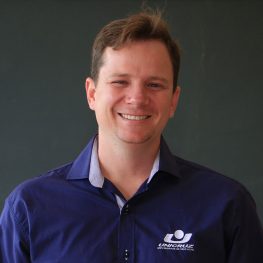
COMPUTER SCIENCE
Alex Vinícios Telocken
Coordinator
The professional market has no barriers to a promising life with excellent remuneration. The Bachelor of Computer Science can work at home, with his computer, in large companies or in academia. A course with a high level proposal in terms of quality and demand connects students and graduates to companies of national, international scope and universities. The wide possibilities of action that are provided facilitate the insertion in the job market.

Evening
8 semesters
Bachelor
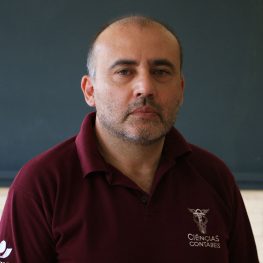
ACCOUNTING SCIENCES
Marcelo Gonçalves de Castro
Coordinator
Accountant develops a strategic look at numbers. Analyze, plan, coordinate and control. These verbs configure your professional practice, interpreting the numbers and what they reveal and using this information for better business management. Enabling a broad view of reality in the past, present and future, is one of its main tasks. It also helps to develop and execute operational and investment plans. In addition, its exclusive activities are auditing and accounting expertise.

Evening
8 semesters
Bachelor

LAW
Fátima Fagundes Barasuol Hammarströn
Coordinator
The Unicruz Law student is encouraged to think about society from a republican and democratic perspective, seeking not only the maintenance, but also the improvement of the
rule of law and our constitutionalism. The course integrates with the needs of the market, training professionals with a broad and general view of social and legal demands. The Law student has a Center for Legal Practices – NPJ in Cruz Alta, Ibirubá, Júlio de Castilhos and
Panambi. It also has a Research and Complementary Activities Nucleus and a Course Completion Work Nucleus, as well as an extension project “Consumer Counter: the consumer right within everyone’s reach”, in partnership with PROCON / RS.

Afternoon/Evening
10 semesters
Bachelor
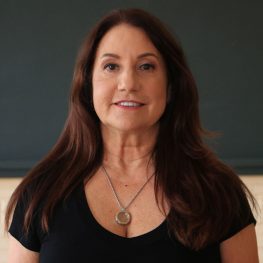
PHYSICAL EDUCATION – BACHELOR
Vania Mari Rossato
Coordinator
It is proven that the harmony between well-being and health depends directly on Physical Activity. The professional capable of balancing this fundamental combination for quality of life is the graduate of the Higher Physical Education Course – Bacharelado, through the provision of services to the population in all activities related to Physical Education. The Physical Education Course – Bachelor’s Degree deepens knowledge for three areas of activity: Sports Training in sports clubs, Physical Fitness in gyms and bodybuilding and Human Aging in clinics or groups of senior citizens. The course offers complete infrastructure such as sports courts, exercise room, dance room, weight room, athletics track, soccer field, kinesiology laboratories, physiology, exercise physiology, human anatomy and kineanthropometry. In addition, intervention in the labor market occurs during the course in regular and extracurricular internships through agreements with companies and institutions.

Evening
8 semesters
Bachelor

PHYSICAL EDUCATION – LICENTIATE
Marilia de Rosso Krug
Coordinator
It is proven that the harmony between well-being and health depends directly on Physical Activity. The professional capable of balancing this fundamental combination for quality of life is the graduate of the Higher Physical Education Course – Licentiate providing services to the population in all activities related to Physical Education. The course offers complete infrastructure such as sports courts, exercise room, dance room,
weight room, athletics track, soccer field, kinesiology laboratories, physiology, effort physiology, human anatomy and kineanthropometry.

Afternoon/Evening
7 semesters
Licentiate

NURSING
Cristiane Apio Motta Dias
Coordinator
Acting with excellence with individuals and institutions in different areas of the health sector, with comprehensive care and qualified humanized care. The Nursing Course at Unicruz trains professionals with a political, participatory, technical-scientific, critical, reflective, active-researcher profile, capable of responding to the demands of a broad and competitive market. The insertion of the Course in the municipal, regional and state health sectors, acting in accordance with Public Health Policies at the primary, secondary and tertiary levels allows the student to participate in activities that go far beyond the classroom.

Evening
10 semesters
Bachelor
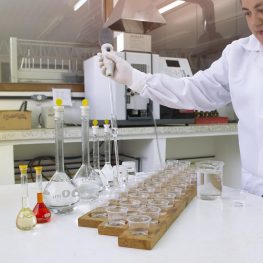
ENVIRONMENTAL AND SANITARY ENGINEERING
Cristiane Apio Motta Dias
Coordinator
The Sanitary Environmental Engineer is the professional capable of contributing to the current progress, while helping to guarantee the future. Its primary function is to preserve the quality of the soil, air and water, carrying out environmental impact studies and proposing solutions for the rational use of natural resources. Studying Environmental and Sanitary Engineering at Unicruz means having access to several practical experiences, in addition to a vast theoretical deepening.

Evening
10 semesters
Bachelor

CIVIL ENGINEERING
Carine Norbak
Coordinator
Planning and executing the construction of houses, buildings, highways and urban spaces are just some of the duties of the Civil Engineer. The professional in this area is one of the mentors of big cities, using his knowledge in the area of exact sciences, computers and logical reasoning, in addition to teamwork! Unicruz’s Civil Engineering course prepares people capable of leading and conducting small and large projects, investing in theoretical, technical and practical training. Unicruz is one of the great references of the Alto Jacuí Regional Development Council (Corede), which concentrates 14 municipalities. The Civil Engineering course aims to train conscientious and entrepreneurial professionals.

Evening
10 semesters
Bachelor

PRODUCTION ENGINEERING
Gil Eduardo Guimarães
Coordinator
You in high productivity to think, plan, implement, operate, maintain and improve the productive systems of goods and services, involving human, financial and material resources,
technology, information and energy. All these verbs can materialize in real actions for those who choose Production Engineering as a profession, fundamental in industries and companies in almost all sectors. The Production Engineer has the specific area of knowledge as managerial methods, the implementation of computerized systems, the use of methods to improve the efficiency of companies and the use of control systems for management and business processes.

Evening
10 semesters
Bachelor
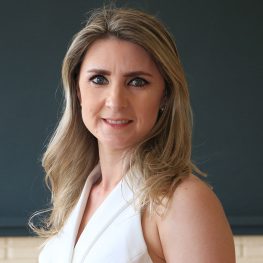
TECHNOLOGIST IN AESTHETICS AND COSMETICS
Viviane Cecilia Kessler Nunes Deuschle
Coordinator
Health, well-being and self-confidence. You can provide all this to people in this promising and highly valued area. The Technologist Course in Aesthetics and Cosmetics at Unicruz is part of the undergraduate courses at the Health Sciences Center, being the only one in the region that broadly addresses body, facial, makeup and capillary aesthetics, as well as alternative therapies, which provides a broad training and totally differentiated.

Evening
6 semesters
Technologist

PHARMACY
Josiane Woutheres Bortolotto
Coordinator
The professional scope of the pharmacist defined by Decree Law nº 85.878 / 81, is an important reference in the formulation of the professional profile graduated by UNICRUZ.
Therefore, the Pharmacy Course aims to train a health professional with broad and diversified knowledge, capable of performing the duties relevant to the pharmacist with skill, ethics and responsibility. To this end, the curricular bases are designed to provide necessary knowledge in the following competencies and skills:
- Performance in pharmacies and drugstores;
- Performance in multidisciplinary teams, with emphasis on the Unified Health System;
- Drug design, production and control;
- Execution of activities in clinical and toxicological analyzes, Control, production and analysis of food;
- Performance in multiprofessional teams;
- Develop the environmental education policy;
- Performance in teaching, research and extension activities;
- Develop human rights education, Afro-Brazilian, African and Indigenous culture.
Contact:

Evening
10 semesters
Bachelor

PHYSIOTHERAPY
Lia da Porciuncula Dias da Costa
Coordinator
Prevent, rehabilitate, modify. These are verbs present in the daily routine of the Physiotherapist, a professional who dedicates his career to the study and treatment of
disorders of biomechanics and human functionality. In this perspective, aware of the responsibility of this activity, Unicruz’s Physiotherapy Course is structured with more than 1000 hours of curricular internship and inserts the student in professional practices since the first semester of the course.

Evening
10 semesters
Bachelor

JOURNALISM
Caroline Giacobbo
Coordinator
With multiple opportunities in the job market since the first semester: paid scholarships, contact with vehicles and companies provided by meetings and events promoted by the
course, internships, technical trips, availability of modern laboratories and equipped for practical experiences, teachers with market experience and contact networks. A multimedia course, as the subjects concentrate all segments of the area: TV, radio, printed newspaper and online.

Evening
8 semesters
Bachelor

VETERINARY MEDICINE
Vitor da Rocha Sperotto
Coordinator
To be qualified for outstanding performance, based on ethical issues and responsibility for social development, depends on solid training and which allows contact with practice. The appreciation of professional experience is a major differential of the Course so that the student is an agent of change, committed to social reality and the permanent search for new technologies and solutions to improve the quality of human and animal life.

Daytime/Evening
10 semesters
Bachelor

PEDAGOGY
Fátima Terezinha Lopes da Costa
Coordinator
You as the promoter of our greatest wealth TO BE a social educator, to be able to contribute to the formation of the present and the future, to be a mediator of the knowledge that liberates. Being a Pedagogue is holding the key to social transformation, opening several doors that lead to the greatest good of humanity: Education.

Evening
8 semesters
Licentiate

GRADUATE PROGRAM ON SOCIOCULTURAL PRACTICES AND SOCIAL DEVELOPMENT
The Graduate Program in Sociocultural Practices and Social Development at Unicruz, currently rated 4, has been accredited by CAPES since 2013 to offer an Academic Master’s Degree, being the first class of 2014 and, since 2020, accredited by CAPES to offer Academic Doctorate. The Program aims to train researchers and social agents endowed with theoretical- investigative autonomy, to act in scientific research, in teaching and in public and private organizations, able to articulate innovative socio-cultural practices of social, economic and environmental impact, in an interdisciplinary perspective. The Graduate Program in Sociocultural Practices and Social Development annually offers the following vacancies: 22 vacancies for the Master’s Course and 11 vacancies for the Doctorate Course. Admission is through a selection process coordinated by the Program’s Collegiate Body and published by specific public notice.
RESEARCH LINES
Concentration area: Sociocultural Practices and Human and Social Development
Line 1: Language, Communication and Society
This line aims to discuss aspects and issues that involve language in its multiple factors, such as: language, discourse, ideology, narratives of your daily life; construction of meaning and meaning of social, cultural, political, economic and environmental actions and practices, carried out by the loco-regional communities and their relationship with human and social development, in a global perspective.
Line 2: Sociocultural Practices and Contemporary Society
This line aims at the theoretical discussion of practices that involve social, cultural, political, economic and environmental issues, in an ethical and citizenship approach that runs through the different cycles of life; the unveiling of intentionality, repercussions, (re) signification of the meaning that these practices have for subjects, in the search for the realization of social rights and human dignity.

GRADUATE PROGRAM IN INTEGRAL HEALTH CARE
Rodrigo de Rosso Krug (Unicruz)
Thiago Gomes Heck (Unijuí)
Coordinators
The Postgraduate Program in Integral Health Care is an interinstitutional project with an interdisciplinary characteristic, in wide association between the University of Cruz Alta
(UNICRUZ) and the Regional University of the Northwest of the State of Rio Grande do Sul (UNIJUÍ). The Program was recommended by CAPES / MEC, in December 2013 and recognized by MEC, in September 2014, for offering an Academic Master’s Degree, which started in May 2014. The Program is dedicated to research and knowledge production in the Health field, with emphasis on two lines: Health-disease-
care processes and Chemical and biological health processes. The target audience of the proposed Program is composed of professionals with higher education in the health area and professionals with training in related areas (Chemistry, Biology and Physics).
The course’s concern is to develop a solid theoretical basis, of an interdisciplinary nature, and to allow students to deepen, based on their interests, research on the central theme of the course, which is Integral Health Care. It is expected that the professionals
trained by the course will build skills and competences that will allow them to conceive, formulate and implement actions, social and health education policies, as well as to develop research applied to the resolution of concrete problems in these different fields. In addition, it makes it possible to work in Higher Education in the health area.
RESEARCH LINES
- Health-disease-care processes
It investigates health care in the different stages of life. It studies, in an interdisciplinary way, the epidemiological, assistance and educational aspects of health, with a focus on protection, care, rehabilitation and the prevention of risks, injuries, complications and therapeutic modalities in health.
- Chemical and biological health processes
Develops experimental and applied research in an interdisciplinary way. Investigates and develops biomarkers through in vitro studies, with animal models and with humans.
It comprises the production of scientific knowledge in order to subsidize and qualify health care.

PROFESSIONAL MASTER IN RURAL DEVELOPMENT
Juliane Nicolodi Camera
Coordinators
Decrease the distances between your professional growth projects and their realization. The best way to go in this direction is continuing education, as in addition to enabling numerous achievements in the labor market, it promotes and fosters knowledge, capable of transforming realities. This is the direction of the Professional Master in Rural Development at the University of Cruz Alta, with the proposal to contribute to:
- The continuous and in-depth training of professionals, seeking to improve their qualified insertion in different realities at regional and / or local level;
- The development of rural space, under different approaches, in order to combine the analysis of the diversities and specificities of local knowledge, with the new world trends, both with regard to new technological formats, as well as territorial dynamics, in an interdisciplinary process;
- The innovation of life processes in society, which implies acting, both on a theoretical and practical basis, for the realization of new experiences in the sustainable use of natural wealth, in the generation of new enterprises, promoting the redirection of the regional economy. This means understanding that livestock and extensive agriculture, traditional on the mainstays of the local economy, have the potential to improve existing production chains, such as milk and soybeans, but also have the potential to diversify, incorporate new productive arrangements, add value agricultural products and insertion in niche markets;
- The insertion of new methodologies and computational technological tools, in order to streamline the decision support systems, the forms of management of the production chains and the rural production units, in addition to training managers to use and articulate the technologies already available, the exploitation of existing resources; the quality, health and certification of agricultural and livestock products; the storage and drying of grains and fodder, logistics infrastructure and transportation of production;
- Solutions to problems related to environmental recovery, resulting from inadequate handling of flora and fauna specimens; and the exhaustion and exasperated depletion of the properties’ soil; as well as for the analysis of the issue of biodiversity, legal reserve and carbon capture;
- The study of public credit and productive development policies, the role of institutional organizations and, mainly, the social issues inherent to social actors inserted in rural areas.
RESEARCH LINES
Concentration area: Sustainable Rural Development
RURAL MANAGEMENT
Analyzes and discusses strategies and alternatives for the development of rural areas. It emphasizes studies of the agricultural market, the possibilities of innovation in the
production chains, the strategies to increase the added value of products, the management of natural resources and their environmental impacts. It also contemplates the rural extension, the general aspects of the legal areas that regulate the necessary relations for the sustainable development promoted by the people and private and public organizations, in what concerns the productive chain and the businesses resulting from the rural activity.
ANIMAL PRODUCTION
It includes the improvement of techniques and innovation in the management of herds (especially nutrition, health and animal welfare) and in genetic improvement. Incorporating environmental issues in the development of activities in rural areas, it emphasizes the dissemination of knowledge and the encouragement of increased meat and milk productivity.
PLANT PRODUCTION
It covers the improvement of techniques and innovation in crop management, storage, marketing of agricultural products, the cultivation of alternative species and the application of biotechnology and precision agriculture. In this line of research, techniques that reconcile the use of natural resources with increased agricultural production are prioritized.

RESEARCH
Janaina Coser
PRO-RECTOR OF GRADUATE, RESEARCH AND EXTENSION
Valeska Martins da Silva
Coordinator
The Research policy at Unicruz fulfills the role of supporting and stimulating academic research, of teachers and students, as it is the official space for the construction and socialization of knowledge. The institutionalization of research is a condition for undergraduate and, especially, graduate courses to be consolidated.
Institutional research is encouraged through its own notices, such as PIBIC – Institutional Program for Scientific Initiation Scholarships at UNICRUZ, PAPCT – Program to Support Scientific and Technological Production and through submission of projects to external Public Notices such as FAPERGS, CAPES, FINEP and CNPq, in addition to an agreement with private companies.
The projects are submitted based on their own notices and are forwarded to external “ad-hoc” consultants and, also, they undergo, internally, the opinion of the Institutional Scientific Committee, according to the Research regulation. In addition, the institution’s support for research occurs through the infrastructure of laboratories, library, graphics and scientific
dissemination through publications (magazines and / or books) and participation in scientific events (own or in other institutions); granting scholarships to academics and encouraging scientific production and qualification of teachers.
For the appreciation of research projects involving human beings or animals, the university has the support of the Research Ethics Committee – CEP, and the Ethics Committee
on the Use of Animals – CEUA, respectively. These committees are made up of collegiate bodies of professionals from different areas and follow national regulations for evaluating projects.
The research also has an annual event to publicize its scientific production that has been carried out for over ten years, in addition to supporting teachers to participate in events.
RESEARCH GROUPS
| Center for Health and Agrarian Sciences – CCSA | ||
|---|---|---|
| RESEARCH GROUPS | 1st LEADER / 2nd LEADER | |
| Collective Health Research Center | – Lia da Porciuncula Dias das Costa – Themis Goretti M. Leal de Carvalho |
|
| Research Group on Comprehensive Health Care – GPAIS | – Viviane Cecília K. Nunes Deuschle | |
| Interdisciplinary Group on Human Aging Studies – GIEEH | – Solange Beatriz Billig Garces – Dinara Hansen Costa |
|
| Physical Education Research and Extension Group – GEPEF | – Rodrigo de Rosso Krug – Vania Mari Rossato |
|
| Nursing Research Group in the context of Comprehensive Health Care – ENFAS | – Eder Luis Arboit | |
| Interdisciplinary Health Research Group – GIPS | – Roberta Cattaneo Horn | |
| Integrated Animal Health Research Group | – Cristina Krauspenhar Rossato – Daniele Mariath Bassuino |
|
| Phytotechnics | – Mauricio Paulo Batistella Pasini – José Luiz Tragnago |
|
| Sustainable Agricultural Production | – Daniele Mariath Bassuino – Claudia Maria Prudêncio de Mera |
|
| Laboratory for Studies and Research in Animal Production – LEPAn | – Luiz Felipe Kruel Borges | |
| Center for Human and Social Sciences – CCHS | ||
|---|---|---|
| RESEARCH GROUPS | 1st LEADER / 2nd LEADER | |
| Regional Development Study and Research Group – GEPEDER | – Fábio Dal-Soto – Juliano Nunes Alves |
|
| Linguistic Studies Group – GEL | – Antonio Escandiel de Souza – Carla Rosane da S. Tavares Alves |
|
| Juridical Research Group on Citizenship, Democracy and Human Rights – GPJUR | – Raquel Buzatti Souto – Tiago Anderson Brutti |
|
| Study, Research and Extension Group in Languages and Communication – GEPELC | – Carla Rosane da S. Tavares Alves – Veronice Mastella da Silva |
|
| Engineering and Technologies – ENGETEC | – Rodrigo Luiz Antoniazzi – Patricia Mariotto Mozzaquatro |
|
| Center for Study and Research in Social Practices | – Sirlei de Lourdes Lauxen – Isadora Wayhs Cadore Virgolin |
|
| Architecture and Urbanism Research Group -GPArq | – Angélica Kohls Schwanz – Marco Antonio Ribeiro Edler |
|
| Research Group on Human and Pedagogical Studies (GPEHP) | – Maria Christina Schettert Moraes – Maria Aparecida Santana Camargo |
|

Entrepreneurship, Innovation and Technology Transfer Agency at the University of Cruz Alta – START
Prof. Dr. Juliano Nunes Alves
General Coordinator of START – UNICRUZ
START is the institutional body responsible for the management and operation of entrepreneurship activities, fundraising, technological innovation, registration of intellectual /
industrial property, social and technological services, establishment of incubators and activities of the Technological Innovation Pole.
The Agency aims to promote the articulation between the academic space, companies and various sectors in the region with a view to improving necessary processes, products and services, in addition, it aims to create synergies between researchers, extension workers,
professionals of the institution and entrepreneurs, acting as facilitating agent and joining efforts for regional development. The Agency is subordinate to the Pro-rector of Graduate Studies, Research and Extension of UNICRUZ and has the following units:
- Fundraising Center;
- Entrepreneurship Office;
- Innovation and Technology Transfer Center;
- Social and Technological Services;
- Alto Jacuí Technological Innovation Center;
- Social Incubator;
- Technological Incubator.



